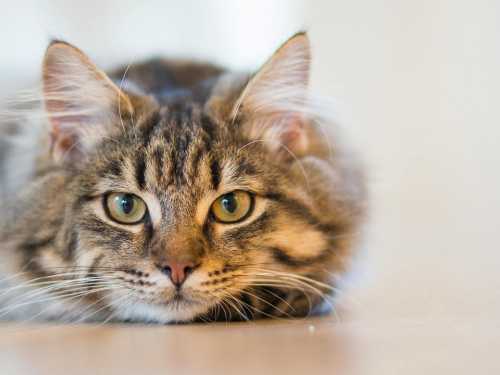
Once upon a time, there lived Varvara. No, it was me, and Varvara existed in another dimension—in the family of my distant relatives. The family consisted of three women. My mother was a good ten years older than me, my daughter, correspondingly, a similar number younger, and I was considered godmother to the latter. This, of course, imposed certain obligations, mostly financial: my goddaughter sometimes needed new shoes, or figure skates, or something else of the sort, but it was absolutely necessary. But there were no particular common interests, and I didn't abuse their hospitality.
Whenever I had to visit the family, the conversations revolved primarily around Varvara. Three voices vied with each other to tell me about her extraordinary talents. Varvara herself ignored me. When she greeted me at the door, she would demonstratively turn away, walk past haughtily, her back exuding cold and absolute contempt. I confess, I reciprocated.
She earned her name for her excessive curiosity and desire to constantly be up-to-date on everything that was going on. She paid for it. A certain part of her body was unnaturally short: it was pinched in a door and required surgery. Over the years, Varvara somewhat lost her curiosity, but she developed a rock-solid sense of self-worth and a striking conviction that everyone around her was obligated to act according to her vision of life. She was incredibly neat and had a maniacal passion for order. She punished carelessly discarded shoes at the door or misplaced items with cruel and inventive tactics.
In general, I, a careless person, was pleased that our life paths did not cross, and I was sure that they never would.
But man assumes… Kazakhstan's acquisition of sovereignty dealt a significant blow to the “ethnic Russians” who had considered this blessed land their homeland for a couple of centuries. Having struggled without decent work (two higher education degrees—geology and patent law—proved useless), having lost friends and family who had decided to emigrate, and having experienced the problems of the Kazakh language, which was inexorably becoming the official language, the family decided there was nothing left to do in Alma-Ata and needed to move to St. Petersburg. After a reconnaissance mission, Marina shipped her belongings in a container, took her daughter, who needed to be enrolled in school, and left her mother to sell the apartment and obtain citizenship. Antonina Georgievna moved in with me for a couple of months.
She was a fantastically goal-oriented and organized woman. Every morning she started with an hour of exercise, the kitchen and the entire apartment sparkled, and upon returning from work, a delicious lunch awaited me. I've probably never tasted such culinary delights in my life. And this despite the fact that she ran daily to various agencies, collecting the necessary documents, and to her empty apartment, waiting for potential buyers. However, the closer the sale process got to completion, the gloomier she became. Varvara was the reason. What to do with her? Transport her for three days on a train… and where to? There was no place to live yet.
It's hard for me to say “no” to someone, but in this case, I categorically refused to take responsibility for her.
Antonina Georgievna approached me with this problem this way and that, but I was adamant. I don't need Varvara; I don't want her in my house.
Finally, the apartment was sold. When I returned home, I found Antonina Georgievna engaged in a curious activity: she was counting the money, sorting it into piles, apparently figuring out how best to spend it. She enthusiastically began to recount how well everything had worked out, but she kept her eyes averted from me.
“What about Varvara?” I felt an overwhelming urge to look under the beds.
– She… left.
– Where?
“To the basement… I'm sorry, I couldn't leave her, so I brought her here. But she didn't want to come into the apartment and ran into the basement.”
– So what now?
“I don't know…” Tears welled up in Antonina Georgievna's eyes. “I'll probably have to put her to sleep.”
It was a blow below the belt. I had to euthanize an animal. A dog. Getting one was the first time I'd ever taken a completely independent step in my life. But a month later, the dog I'd grown attached to fell ill with a nervous form of distemper. The poor animal was convulsing, whining incessantly in pain, and her legs were paralyzed. A council of dog owners decided to euthanize her. They supplied me with the necessary medications, and, in tears, I administered the tranquilizer, then stopped her heart. I'll never forget the look in the dog's all-knowing eyes. After a nervous breakdown, I decided: no more animals. I don't want pain, I don't want to feel guilty, I don't want responsibility for anyone's life at all. Especially not a cat's. Feeding it is half the problem, but messing with the litter!
So, I went to my room, slammed the door and left Antonina Georgievna to deal with her problems on her own.
My citizenship was delayed, and Antonina Georgievna continued to live with me, delighting me with lunches and dinners. No one spoke of Varvara: I thwarted any attempts to bring her up.
I remember well that on Sunday I allowed myself to lie around a little longer and woke up because Antonina Georgievna was scratching at the door.
“Come and look,” she whispered. Confused, I followed her into my combined bathroom.
The door was slightly open and, pulling me towards the crack, Antonina said in a mysterious whisper:
– Look!
Varvara was perched sideways on the toilet. Her gaze was vacant, like all cats doing their business. Having finished her dirty work, she balanced on the side of the toilet, rose up on her hind legs, and leaned her entire body against the flush handle. After watching the mass of water disappear with a roar, she jumped to the floor and began licking herself frantically.
“See, she won't be a problem for you!” Antonina Georgievna declared with a triumphant smile. “Well, let her stay, okay?”
Shocked, I nodded my head.
It turned out Varvara had been living in my house for several days, hiding in Antonina Georgievna's room, wisely keeping a low profile. After the premiere, she grew bolder and stayed close to her mistress, not following her closely, but rather anticipating her movements. In the mornings, she led her to the living room where she did her exercises; perched on the table, she watched her movements intently. Then she went to the bathroom and, jumping on the washing machine, waited for her to take a shower. Wherever Antonina went and for whatever reason, Varvara walked ahead. At every opportunity, she would jump onto her lap and purr contentedly, receiving her share of caresses. Antonina Georgievna almost completely stopped communicating with me – she talked with Varvara. Their touching unity touched and somewhat frightened me: citizenship was finally obtained, and I had to stay with Varvara, who still considered me a piece of furniture, tete-a-tete.
When I returned home after putting Antonina Georgievna on the train, Varvara met me at the door. Meowing demandingly and questioningly, and receiving the answer that her mistress had left, she didn't believe me and began scratching at the door with her claws, demanding that it be opened. Satisfied that no one was hiding behind it, the cat meowed mournfully and retreated to the room where Antonina had slept.
In the morning, she didn't come out or meet me after work, and when I peeked into the kitchen, I saw that no one had touched the food I'd left behind. Concerned, I hurried into the now-empty room. Varvara was sitting hunched over on the bed. The wild hope that had flickered in her eyes gave way to dull indifference, and my attempt to pet her resulted in her hissing furiously, wriggling out from under my hand, and scurrying under the bed.
This is the result of my weak character. I started this mess, now I have to clean it up !





